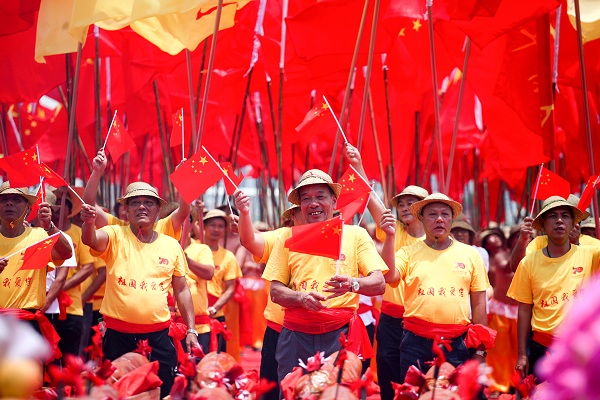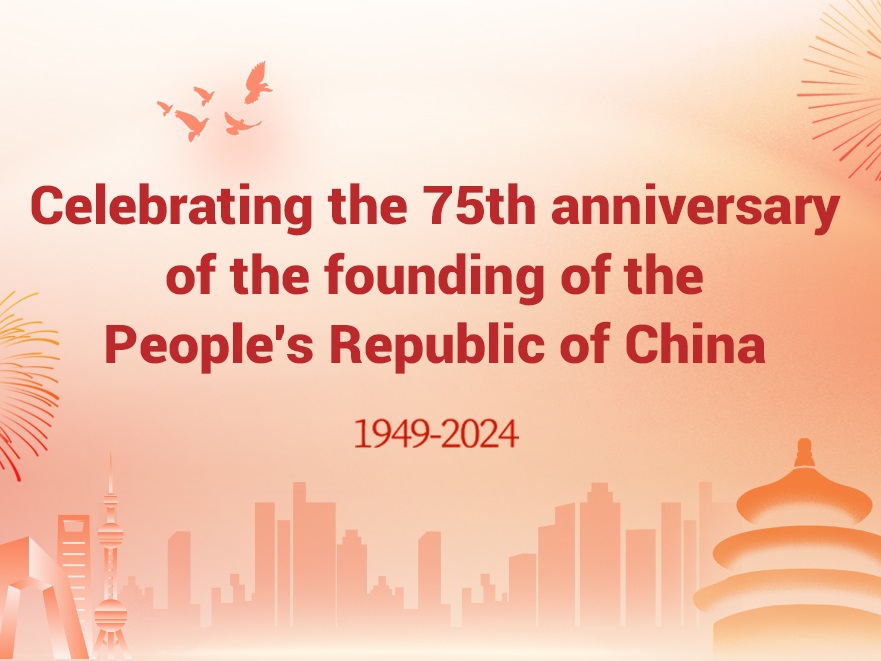With government aid, returnees fish their way to prosperity in Guangxi

Zhou Shenglin (center), a returnee to China from Cat Ba Island, Vietnam. [Photo by Zhong Xianhong/for China Daily]
According to Zhou Shenglin, the greatest accomplishment of his life was to settle down in Qiaogang town, Guangxi Zhuang autonomous region, after living abroad for many years.
One of the largest communities for Chinese returnees in the country, the town has developed from an overgrown wasteland in the past four decades.
Zhou was born in Cat Ba Island, Vietnam, and came back to his ancestral home of Beihai city, Guangxi, in 1978 when an anti-Chinese movement broke out in Vietnam.
"I will never forget the day-April 30, 1978-when 25 members of my family left Cat Ba Island in two fishing boats and arrived in Beihai after half a month of floating at sea," the 73-year-old said.
At that time, nearly 7,000 refugees like Zhou flooded Beihai, causing unrest in the city, which faced a huge challenge receiving such a great number of refugees.
The Chinese government provided them with temporary shelters and daily necessities and set up the township in 1979.
"Although the whole nation was facing material shortages, our motherland accepted us generously when we were homeless and helpless," Zhou said.
Zhou keeps the license, numbered "3331", that he once used to get food and daily necessities from the government, to remind him of the bitterness of his past life.
Some of those who returned to China decided to leave the country and go abroad again, including Zhou's sister and his two brothers, who fled to the United States to seek a living.
"Frankly speaking, I also considered leaving, but rather than endure the vagrant lifestyles that my ancestors experienced when they lived abroad, I preferred to settle down in our motherland and create a life of my own," he said.
Funded by the Chinese government and the United Nations High Commissioner for Refugees, Beihai built 1,000 resettlement apartments for the returnees.
Zhou described his family as "overjoyed" when they received an apartment with two rooms for free. In addition, the community was equipped with fishing ports, hospitals and schools.
Since he was determined to stay, Zhou began to strive for a better future for his big family.
In a bid to further improve the residents' livelihood, the local government set up fishing cooperatives to unite the individuals who used to fish while living abroad.
Once a chief engineer for fishing vessels in Vietnam, Zhou was selected as the leader of one of the cooperatives in 1984. He was even sent to Vietnam again to learn fishing techniques.
Zhou's fishing cooperative developed into a shrimp company called Fuhua whose shrimp boats had increased from six to 120 by 2003, and he was appointed manager.
"My company's growth is minor compared to the development of the fishing industry in Qiaogang," he said.
According to Zhou, the town was established with only 600 small boats and a dozen decrepit sailboats. Nowadays, the town runs 10 fishing companies and boasts 2,000 modern boats.
"Qiaogang has already grown into the greatest fishing base of Guangxi, selling 500,000 metric tons of aquatic products annually," said Zhou proudly.
Besides the fishery, Qiaogang is also a popular scenic spot known for its silver beach and "midnight diner" street.
"Not only are the returned overseas Chinese living a stable and pleasant life here, tourists from all over the world can also feel at home in Qiaogang," said Lai Weiqing, Party chief of Qiaogang town.
According to Lai, the town receives over 3.5 million visits annually.
Since retiring in 2008, Zhou has organized various amusements to entertain himself while living in his self-built, three-story apartment.
In 2016, Zhou visited his relatives and friends abroad.
"Some of my friends told me that the development of China in recent years is unbelievable," Zhou said. "For me, the motherland is the safest place in the world. I am very grateful for the care it provides."


